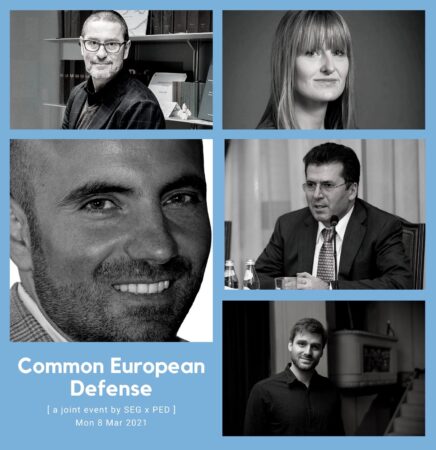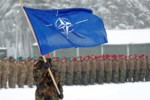‘There is no defence without a state, and there is no state without defence’. This is how the first events of the Shipping, Energy, and Geopolitics Bocconi Student Association in co-operation with the Politics and Economic Development Bocconi Student Association started on Monday the 8th of March. Made up of a panel of interesting speakers from different backgrounds, the discussion revolved around the much-discussed and very contemporary topic of defence, its future and the progression of Europe along a common path.
In a welcoming commencement, Ms Catherine de Vries, Professor for Political Science and Dean of Diversity and Inclusion at Bocconi University, walked the attendees along the history of the North Atlantic Treaty Organization (NATO), pointing out its role and outlining its position in the map of future Europe. She laid the foundation of the discussion, which built on the idea of a Europe that is progressing and changing, with the notable reference to Brexit and the COVID-19 pandemic. Opening Pandora’s box, Professor de Vries stressed the need to address the issue of integration and multilateralism in a setting that is bound to change even more, especially with regards to the management of the pandemic and Brexit. Despite the need for this greater integration, Professor de Vries also recognized the challenge of unity and further integration, pointing to the wide range of political institutions and ideologies that dominate Europe at the moment, hindering the removal of political obstacles towards fewer differences.
Following Professor de Vries’ talk, Professor Colli provided some much-needed historical insight on European integration. He pointed out that close cooperation and coordination among European states dates back to the mid-19th century, referencing the cooperation of European states in their effort to prevent the Russia Empire from reaching the Black Sea. In the context of a post-Cold War era, deeply into globalization and fully immersed in automation and technological development, professor Colli additionally stressed the uncertainty that revolves around Europe’s future. Since ‘this isn’t just about defence’, politicians and risk analysts need to see ‘what’s next for Europe’ and its policy regarding a common defence system in an increasingly more uncertain world.

Following up on the idea of uncertainty about the future, Colonel Andrea Truppo argued that apart from determining what lies ahead for State defence systems and domestic considerations regarding military preparedness, European states ought to overcome another real challenge. The true challenge that lies ahead for Europe, according to Colonel Truppo, is none other than the harmonization of priorities as far as issues of importance are concerned. That is not to say that nations will not need to have state of the art defence systems for their own purposes, but the logarithmically increasing need for coordination of security priorities means that unless the European States coordinate, they will ‘no longer be relevant on their own. In this sense, European policymakers should not turn away from the concepts of economy, efficiency, and effectiveness, but they should embrace them by keeping in mind the need to preserve a national flavour in a growingly harmonizing environment.
The former Minister of Defense of Albania, Fatmir Mediu, was another firm supporter of integration, and strongly highlighted the role of the European Union and NATO as institutions representing unity and progress. Outlining that Europe’s three main pillars – the political, economic, and defence pillars – need to be balanced equally well, Mr. Mediu drew on the current asymmetric threats that European states are facing and pointed to the need for more collective action. The current challenges that lie ahead for Europe, such as 5G, space law, and other hybrid threats, create the need for more investment towards coordinated action and strengthening of European ties.
The fourth-panel speaker, Andrea Venzon (Co-founder of NOW!), approached the issue of a common European defence from the perspective of European autonomy and a possible detachment of the continent from greater international integration. He pointed to the growing chasm formed between the US and China, a result of a modernized and more globalized Cold War, and Europe’s challenge in having to choose between either titan or standing firmly alone. The puzzle of political cultures and ideologies that exists within Europe poses a challenge when it comes to the formulation of a common defence policy. Mr. Venzon argued that, given that Europe has a ‘tough period ahead to see what it stands for and why’, unless these differences are removed from the equation and some common structures are formed, the continent will have a hard time approaching the issue of a common defence system.

All speakers shared two common elements. They all spoke of the need for a rejuvenating breath for Europe. Still struggling to overcome the pandemic that shattered any sense of normalcy, European countries have been called to overcome their differences and unite in the face of a common purpose. Their international cultural and political priorities differentiated them from one another, but their similar mindsets allow them to dream of a common defence system against the growing challenges. The reforming of the existing institutions, even the replacement with newer ones, will be a hard task but might be a necessary one if we are to refer to some common European defence system in the next few years.
The second similar element among all speakers was the need to embrace the concept of ‘unity’. Whether this is in the form of NATO, the EU, or both at the same time, the presenters recognized that, exactly because of the growing internationalization of threats and the increasingly more globalized economies that Europeans are now called to progress in, the adoption of common paths as far as the three pillars of politics, economics, and defence are concerned will be pivotal.
In the next years, if we are to refer to some European defence system, policymakers have to combine elements of pragmatic thought, optimal decision making, feasible economic solution, viable military organization and, of course, the involvement of voices that come from such a heterogeneous climate as Europe.






Leave a Reply